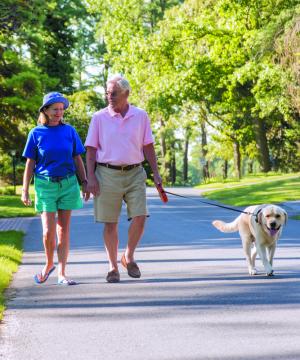Companion animals offer scientifically proven health benefits
Best friends keep getting better. More dogs and other animals are going to work as animal-assisted and pet therapists. Even a therapeutic, interactive robot created by the Japanese is helping reduce stress for healthcare patients. Paro, who looks like a fluffy white seal, responds to voice, touch, light and temperature.
The good news is these animal helpers - real and robotic - are creating more jobs while transforming the well-being of people who need it most: those with at-home care or who are in assisted living or care facilities, hospitals, schools, correctional facilities and mental institutions.
Companion creatures give therapy simply by being with people. Dogs, cats and rabbits sit with people, cuddle, play, walk and rest by their side. Cats calmingly purr. Horses carry people. Fish dazzle and calm by gliding through water. Animals allow you to groom, feed, watch and care for them, and the result is longer, healthier, happier lives for individuals and and the animals - plus a field of research and vocation that’s booming.
The U.S. Department of Labor expects therapy jobs and positions, including pet and animal-assisted therapy, to grow more than 27 percent in the next decade. More than 90 percent of Americans in both pet-owning and non-pet-owning households told the American Humane Society in a 2012 survey that they believe an animal companion improves lives, especially the lives of people living alone, those who need at-home care, senior citizens, people who are handicapped and young children.
“The positive effects of pet and animal-assisted therapy are undeniable,” said Dave Watt, owner of Acclaim Home Care in Lewes. “As adult home care providers, we’ve seen pets ease loneliness and give a purpose for getting out of bed. Now science and medicine prove that time with a pet, something that doesn’t have to cost a lot and can help people right at home, can be one of the best ways to boost physical, mental and emotional health.”
Increasing evidence shows pet and animal-assisted therapy helps reduce depression, irritability and agitation, while increasing social engagement for people with Alzheimer’s and dementia. Mara M. Baun, DNSc, who is with the University of Texas Health Science Center in Houston, has documented for more than a decade how animal visits also foster greater physical activity (when people groom, play with and walk the pets), improved eating, more attempts to communicate, and greater pleasure and happiness (more laughter and smiles during time with the animals).
Animal therapy can ease anxiety, according to a two-year study that Alberta Health began in 2003, which shows a reduction of symptoms and panic attacks in 80 percent of people given dog companions.
Pet therapy can decrease sleeplessness and suicidal thoughts from post-traumatic stress disorder, otherwise only treated with medication, especially for war veterans and trauma survivors. In one 2011 study by the U.S. Army with the Psychiatric Service Dog Society, 82 percent of people given service dogs reported reduced symptoms within one month.
Animal therapy can manage pain, particularly with cancer, as cited by The Gale Group Inc. in a 2010 report on cancer visitation therapy regarding the effects of dogs spending time with children with cancer.
Animal therapy can lower hypertension and reduce heart attacks, as noted in a 2005 study at UCLA Medical Center where cardiac patients exhibited lower adrenalin levels associated with stress.
It can foster healing after surgery and invasive medical procedures, even dental appointments, as proven by the Mayo Clinic in Rochester, Minn., that in 2002 introduced Dr. Jack, a miniature pinscher as its first facility-based service dog.
Pet therapy can create more happiness and comfort by increasing levels of the hormone oxytocin. In a study by the University of Missouri-Columbia’s Center for the Study of Animal Wellness, simply petting a dog, cat or rabbit for 15-30 minutes increased the feel-good hormone oxytocin and its several partnering stress-beating hormones.
“As more people see the overall health benefits of pet and animal-assisted therapy, the practice will continue to grow throughout the U.S.,” said Watt. “It’s inspiring to see the elderly light up when they interact with a pet. Their everyday lives are enriched because of the companionship pets provide.”
For more information, go to www.acclaimathome.com or contact David Watt for estate planning and elder law advice at 302-645-7416.


















































